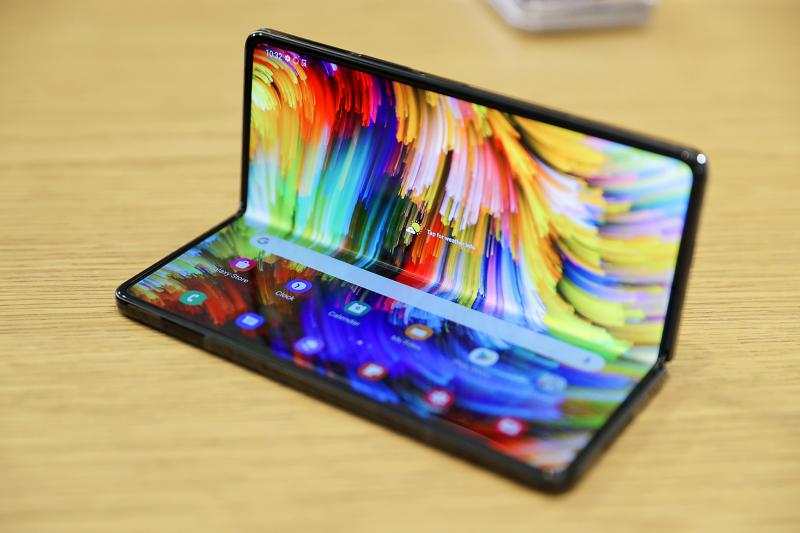Samsung Electronics Co’s operating profit rose more than 25 percent thanks to rising prices for semiconductors and surprisingly strong demand for its pricey foldable smartphones.
South Korea’s largest company reported operating profit of 15.8 trillion won (US$13.2 billion) in the three months ended last month, in line with the 15.75 trillion won average of analyst estimates. Sales were 73 trillion won, compared with estimates of 73.5 trillion, according to preliminary results released yesterday.
The world’s largest maker of memory chips and smartphones has benefited from strong demand as the global economy recovers from the COVID-19 pandemic. Chronic shortages have pushed up prices of memory chips, used in everything from mobile phones to smart cars, and the data centers powering cloud computing and services. Samsung is also expanding its foundry business, churning out custom chips for customers like Nvidia Corp.

Photo: AP
In the mobile business, Samsung is ramping up production to meet strong demand for its foldable phones. The Z series, launched in August, can cost more than US$1,800 but also includes the first sub-US$1,000 foldable in the Galaxy Z Flip 3, which has expanded the category’s customer base.
Samsung sold one million new foldable phones at home in Korea at the third-fastest sales pace after its Note 10 and Galaxy S8, the company said.
While Samsung is better known outside of South Korea for its smartphones, its profits are largely driven by its memory-chip business. Semiconductors account for the largest slice of its income.
Memory chip prices are expected to fall in the current quarter because of stockpiling by customers, signaling a potential cyclical downturn. Micron Technology Inc, one of Samsung’s primary rivals, gave a conservative outlook because PC demand is slowing.
“DRAM operating profit could climb due to sequential bit growth of 3-5 percent and also price rises in 3Q. NAND may also drive strong profit growth in 3Q due to a 10-15 percent sequential rise in bit shipments with a price increase of 5-9 percent. The chip shortage may help operating profit for the foundry business climb in 3Q. New foldable smartphones may fuel sales growth in the mobile division,” Bloomberg Intelligence said.
“While we expect DRAM market weakness in 4Q in 2021 and 1Q in 2022 on weak PC demand and relatively high inventory level at clients, we believe memory makers are more likely to accumulate inventory and revise down their 2022 capex to support memory pricing, rather than maximizing production,” Citigroup analyst Peter Lee said. “In any case, we expect the DRAM market to recover in 2022 due to supply constraint, given limited available clean room space and the launch of DDR5 products.”
Samsung’s foundry business has benefited from the transition to 5G wireless technology and high-performance computing, which have increased the global need for more sophisticated chips.
Robust sales of the Z foldable phones are likely to continue into the first quarter, and Chinese smartphone brands are increasing their purchases of foldable displays from Samsung, said Greg Roh, a senior vice president at HMC Securities.

KEEPING UP: The acquisition of a cleanroom in Taiwan would enable Micron to increase production in a market where demand continues to outpace supply, a Micron official said Micron Technology Inc has signed a letter of intent to buy a fabrication site in Taiwan from Powerchip Semiconductor Manufacturing Corp (力積電) for US$1.8 billion to expand its production of memory chips. Micron would take control of the P5 site in Miaoli County’s Tongluo Township (銅鑼) and plans to ramp up DRAM production in phases after the transaction closes in the second quarter, the company said in a statement on Saturday. The acquisition includes an existing 12 inch fab cleanroom of 27,871m2 and would further position Micron to address growing global demand for memory solutions, the company said. Micron expects the transaction to

Vincent Wei led fellow Singaporean farmers around an empty Malaysian plot, laying out plans for a greenhouse and rows of leafy vegetables. What he pitched was not just space for crops, but a lifeline for growers struggling to make ends meet in a city-state with high prices and little vacant land. The future agriculture hub is part of a joint special economic zone launched last year by the two neighbors, expected to cost US$123 million and produce 10,000 tonnes of fresh produce annually. It is attracting Singaporean farmers with promises of cheaper land, labor and energy just over the border.

US actor Matthew McConaughey has filed recordings of his image and voice with US patent authorities to protect them from unauthorized usage by artificial intelligence (AI) platforms, a representative said earlier this week. Several video clips and audio recordings were registered by the commercial arm of the Just Keep Livin’ Foundation, a non-profit created by the Oscar-winning actor and his wife, Camila, according to the US Patent and Trademark Office database. Many artists are increasingly concerned about the uncontrolled use of their image via generative AI since the rollout of ChatGPT and other AI-powered tools. Several US states have adopted

A proposed billionaires’ tax in California has ignited a political uproar in Silicon Valley, with tech titans threatening to leave the state while California Governor Gavin Newsom of the Democratic Party maneuvers to defeat a levy that he fears would lead to an exodus of wealth. A technology mecca, California has more billionaires than any other US state — a few hundred, by some estimates. About half its personal income tax revenue, a financial backbone in the nearly US$350 billion budget, comes from the top 1 percent of earners. A large healthcare union is attempting to place a proposal before